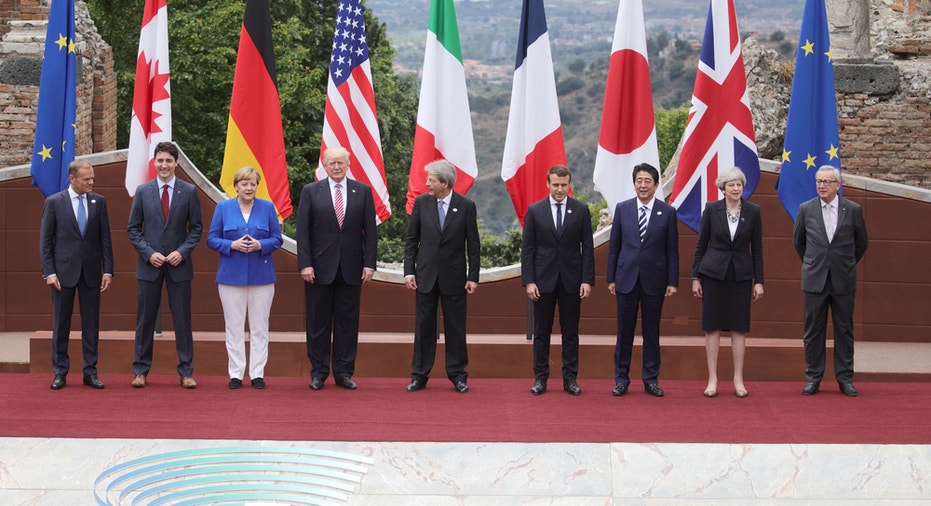Trump says he'll decide on Paris climate deal next week

President Donald Trump says he'll make a final decision on whether the U.S. will stay in the Paris climate agreement next week.
Trump's surprise announcement, in the form of a tweet on the final day of his lengthy international trip, comes after Trump declined to commit to staying in a sweeping climate deal, refusing to give into intense international pressure.
Earlier Saturday, the other six members of the G-7, a group of some of the world's wealthiest nations, voted to abide by the Paris climate agreement, according to a person familiar with the talks. The person spoke on condition of anonymity to discuss the matter before the formal announcement.
Trump was cajoled for three days — first in Brussels at meetings of NATO and the European Union, then in Sicily for G-7 — but will leave Italy without making clear where he stands. Under the G-7 agreement, the Trump administration will be given more time to consider whether it will remain committed to the 2015 Paris deal to rein in greenhouse gas emissions.
Backing out of the climate accord had been a central plank of Trump's campaign and aides have been exploring whether they can adjust the framework of the deal even if they don't opt out entirely. Other G-7 nations leaned heavily on Trump to stay in the climate deal, with German Chancellor Angela Merkel saying "we put forward very many arguments."
"His views are evolving, he came here to learn and get smarter," Gary Cohn, national economic council director, said Friday of the president's thinking.
Trump, who will return to the White House under a cloud of scandal, started Saturday at the second day of the G-7 summit in Sicily, bringing to an end a nine-day trip that started in Saudi Arabia and Israel before moving on to three European stops.
The trip has largely gone off without a major misstep, with the administration touting the president's efforts to birth a new coalition to fight terrorism, while admonishing partners in an old alliance to pay their fair share.
"Big G7 meetings today. Lots of very important matters under discussion," Trump tweeted between events. "First on the list, of course, is terrorism. #G7Taormina."
Trump also touted a renewed commitment by NATO's member to spend more on defense.
"Many NATO countries have agreed to step up payments considerably, as they should. Money is beginning to pour in- NATO will be much stronger," he said. Trump was referring to a vow by NATO countries to move toward spending 2 percent of their gross domestic product on defense by 2024. Only five of NATO's 28 members meet the target: Britain, Estonia, debt-laden Greece, Poland and the United States, which spends more on defense than all the other allies combined.
There is no evidence that money has begun to "pour in" — and countries do not pay the U.S. or NATO directly. But Germany, for instance, has been increasing its defense spending with the goal of reaching the 2 percent target by 2024.
But after the pomp of presidential travel overseas, Trump will return to Washington to find the same problems that have dogged him.
As a newly-appointed special counsel is beginning his investigation into links between the Trump campaign and Russian officials, Jared Kushner, the president's son-in-law and close adviser, has become a focus of the probe, according to The Washington Post. His lawyer said Kushner will cooperate with investigators.
James Comey, the former FBI director leading the Russian probe until Trump abruptly fired him, is still expected to testify before Congress about the memos he kept on conversations with the president that involved the investigation.
The search for a new FBI director continues.
And Trump's policy agenda has run into problems. The GOP health care bill that passed the House faces uncertain prospects in the Senate, after a Congressional Budget Office analysis that it would leave 23 million more Americans uninsured by 2026. The president's budget was widely criticized for deep cuts to safety net programs. And some are starting to question the chances for tax reform.
But first Trump has to finish the day in Sicily, which includes a meeting with small African nations and a G-7 leader lunch. After the summit, the president will address American troops on an Italian base before departing for home.
Not yet on the agenda: a news conference.
If that holds, Trump will break with presidential precedent by not holding at least one lengthy question-and-answer session with the press while abroad. Anxious about Trump's tendency to make things worse for himself with unscripted remarks, the White House staff has kept the president a safe distance from journalists for most of the trip.
Trump was warmly welcomed in the Middle East, but in Europe he's faced a far cooler reception. He's been willing to risk disapproval, engaging in an extraordinary scolding of close allies over their responsibility to pay for mutual defense.
Trump took part in the ceremonial spectacle of the summit over the two days, this time at a picturesque Sicilian town above the Mediterranean Sea. But he also held one-on-one meetings with the leaders of Japan, the United Kingdom, Canada and Germany. The meeting with Merkel came just a day after Trump reportedly called Germans "bad." Cohn stressed Friday that the president was simply being critical of the U.S. trade imbalance with Germany.
Trump also understands that Germany is bound by the rules of the European Union and could not unilaterally change its trade policies, Cohn said. Trade was a big topic, with Cohn saying the United States' guiding principle will be "we will treat you the way you treat us," suggesting that retaliatory tariffs could be imposed.



















